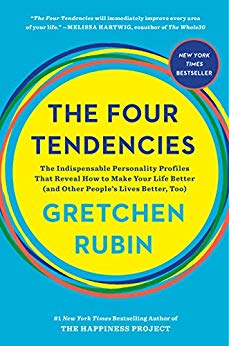

This article is an excerpt from the Shortform summary of "The Four Tendencies" by Gretchen Rubin. Shortform has the world's best summaries of books you should be reading.
Like this article? Sign up for a free trial here .
Want to figure out which of Gretchen Rubin’s Four Tendencies you are? Are you an Upholder, Rebel, Questioner, or Obliger?
Gretchen Rubin’s Four Tendencies can explain why your daughter won’t do anything when you ask her to, why your spouse will go to the ends of the earth for you but can never seem to do anything for himself, and why your colleague asks too many questions at team meetings.
Take our version of Rubin’s Four Tendencies Quiz below to find out which tendencies you have.
Take the Four Tendencies Quiz
This article contains our adaptation of the quiz Gretchen Rubin offers in the book and on her website. When answering these questions, choose the answer that is most generally true for you: don’t look for exceptions to the rule or focus on one area of your life.
Keep track of your answers so you can score yourself at the end of the quiz. Questions 1-6 are multiple-choice, and questions 7-13 are statements for you to agree or disagree with in regards to yourself.
Take the Quiz
1. Have you been able to keep a New Year’s resolution if no one else knew about it?
- Yes, I’m good at making and keeping resolutions, even if no one else knows about them.
- I can keep resolutions, but I don’t just make them on January 1 — I make them whenever I need to.
- I give up my resolutions if there’s no one holding me accountable, so much so that I’ve stopped making them.
- No. I don’t like resolutions — I don’t like to feel restricted.
2. How do you view commitments to yourself?
- I honor commitments to myself only if they make sense to do.
- If someone else is a part of the commitment, I’ll make it and keep it. Commitments to myself, I struggle with.
- I don’t like commitments — I don’t like to feel trapped.
- I take commitments I make to myself as seriously as commitments I make to other people.
3. Everyone gets frustrated with themselves from time to time. What frustrates you about yourself?
- I require more information all the time, and it can be exhausting.
- As soon as someone asks me to do something, I don’t want to do it.
- I make time for other people, but can’t seem to make time for myself.
- I can’t relax about my habits or break the rules, even if I want to.
4. Think of the last time you introduced a new habit into your routine and stuck to it. What helped you stick to it?
- I find it easy to create habits and stick to them without help.
- I researched the habit thoroughly and formulated a specific way I could stick to it and why it was important to me.
- Someone held me accountable to stick to it.
- I don’t like routines — I like to do things in the moment instead of planning them in advance.
5. If other people complain about your behavior, what would you be least surprised to hear them say?
- You stick to your routines and habits even when they inconvenience someone else.
- You ask too many questions.
- You don’t make time for yourself.
- You only do what you want, when you want.
6. What description do you most accurately fit into?
- I put others first.
- I’m disciplined, sometimes to a fault.
- I refuse to be bossed around by anyone.
- I ask the necessary questions.
7. When people ask me to do something, I’m less likely to do it, even if the request comes from a superior. This is frustrating to them.
- Agree
- Neutral
- Disagree
8. I do what I think makes sense, even if that means breaking the rules or disagreeing with people.
- Agree
- Neutral
- Disagree
9. Commitments to others should absolutely be kept, but commitments to myself can be broken.
- Agree
- Neutral
- Disagree
10. Sometimes I don’t do something I want to do because someone else wants me to do it.
- Agree
- Neutral
- Disagree
11. I would describe myself as a people-pleaser.
- Agree
- Neutral
- Disagree
12. I don’t mind breaking the rules — I enjoy it.
- Agree
- Neutral
- Disagree
13. I question the validity of the Four Tendencies system.
- Agree
- Neutral
- Disagree
How to Score
Now that you’ve completed the quiz and kept track of your answers, go through this key and write down what you got for each question.
1. a=Upholder; b=Questioner; c=Obliger; d=Rebel
2. a=Questioner; b=Obliger; c=Rebel; d=Upholder
3. a=Questioner; b=Rebel; c=Obliger; d=Upholder
4. a=Upholder; b=Questioner; c=Obliger; d=Rebel
5. a=Upholder; b=Questioner; c=Obliger; d=Rebel
6. a=Obliger; b=Upholder; c=Rebel; d=Questioner
For questions 7-13, write down what your “agrees” suggest, and disregard any questions you answered with “neutral” or “disagree.”
7. “Agree” suggests Rebel
8. “Agree” suggests Questioner
9. “Agree” suggests Obliger
10. “Agree” suggests Rebel
11. “Agree” suggests Obliger
12. “Agree” suggests Rebel
13. “Agree” suggests Questioner
Now that you’ve gone through all the questions, tally up your marks for every tendency to find which one you fit into. You may find that one tendency predominantly appears – this is your primary tendency. Then you may find that other tendencies appear at times – these are possible ways you tip.
If you get an equal number of tallies for two different tendencies, this doesn’t mean you’re a mix: choose the tendency that more accurately describes you. You know yourself best, so if you’ve been honest, the answer should make sense to you.
———End of Preview———

Like what you just read? Read the rest of the world's best summary of Gretchen Rubin's "The Four Tendencies" at Shortform . Learn the book's critical concepts in 20 minutes or less .
Here's what you'll find in our full Four Tendencies summary :
- What the Four Tendencies are, in complete detail
- How to compensate for your tendency's weakness
- Which tendency you pair best with romantically
- How to deal with other people's tendencies






